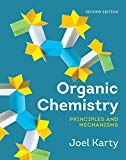
Concept explainers
Interpretation:
A complete, detailed mechanism is to be drawn that accounts for the given product. It is also to be explained why the carbocation rearrangement is favorable.
Concept introduction:
An
The carbocation formed in the first step can rearrange to another one as a result of resonance (delocalization) if it is adjacent to a double or triple bond. A
Want to see the full answer?
Check out a sample textbook solution
Chapter 8 Solutions
Organic Chemistry: Principles and Mechanisms (Second Edition)
- Draw a complete, detailed mechanism for this reaction.arrow_forwardDraw a mechanism to account for the reaction shown here, which scrambles the isotopic labelingarrow_forwardHelp, explain in detail please. Thank you! Did the following overall reaction occur by an SN2, SN1, E2, or E1 mechanism? How do you know? Draw the complete, detailed mechanism to account for the formation of both products.arrow_forward
- Please give the major product of the given reaction with mechanism.Thanks.arrow_forwardDraw the complete, detailed mechanism for the reaction shown here. Will the product be optically active? Explain.arrow_forwardHelp, explain in detail please. Thank you! Did the overal reaction shown here occur by and SN2, Sn1, E2, or E1 mechanism? How do you know? Draw the complete, detailed mechanism to account for the formation of both products.arrow_forward
- Draw a detailed mechanism of the following reactions and determine the major product:arrow_forwardThe reaction shown here is an example of a deiodination. Without AlCl3 present, no reaction occurs. Draw a complete, detailed mechanism forthis reactionarrow_forwardPredict the major products of the following reactions. Draw the complete, detailed mechanism that leads to the formation of each of those products.arrow_forward
- Draw the complete, detailed mechanism and the products for each of the following reactions.arrow_forwardHalogenation using the mixed halogen ICl can feasibly lead to two different products, as shown here. Draw the complete, detailed mechanism for the formation of each product. Which do you think is the major product? Why?arrow_forwardDraw the mechanism and major product of the following reactionarrow_forward
 ChemistryChemistryISBN:9781305957404Author:Steven S. Zumdahl, Susan A. Zumdahl, Donald J. DeCostePublisher:Cengage Learning
ChemistryChemistryISBN:9781305957404Author:Steven S. Zumdahl, Susan A. Zumdahl, Donald J. DeCostePublisher:Cengage Learning ChemistryChemistryISBN:9781259911156Author:Raymond Chang Dr., Jason Overby ProfessorPublisher:McGraw-Hill Education
ChemistryChemistryISBN:9781259911156Author:Raymond Chang Dr., Jason Overby ProfessorPublisher:McGraw-Hill Education Principles of Instrumental AnalysisChemistryISBN:9781305577213Author:Douglas A. Skoog, F. James Holler, Stanley R. CrouchPublisher:Cengage Learning
Principles of Instrumental AnalysisChemistryISBN:9781305577213Author:Douglas A. Skoog, F. James Holler, Stanley R. CrouchPublisher:Cengage Learning Organic ChemistryChemistryISBN:9780078021558Author:Janice Gorzynski Smith Dr.Publisher:McGraw-Hill Education
Organic ChemistryChemistryISBN:9780078021558Author:Janice Gorzynski Smith Dr.Publisher:McGraw-Hill Education Chemistry: Principles and ReactionsChemistryISBN:9781305079373Author:William L. Masterton, Cecile N. HurleyPublisher:Cengage Learning
Chemistry: Principles and ReactionsChemistryISBN:9781305079373Author:William L. Masterton, Cecile N. HurleyPublisher:Cengage Learning Elementary Principles of Chemical Processes, Bind...ChemistryISBN:9781118431221Author:Richard M. Felder, Ronald W. Rousseau, Lisa G. BullardPublisher:WILEY
Elementary Principles of Chemical Processes, Bind...ChemistryISBN:9781118431221Author:Richard M. Felder, Ronald W. Rousseau, Lisa G. BullardPublisher:WILEY





